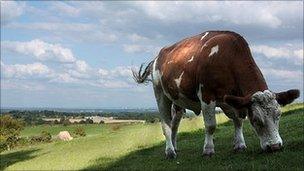West Country beef and lamb and Anglesey Sea Salt gains protected EU status
- Published
- comments

To qualify, beef or lamb will have to come from stock born, raised and slaughtered in the West Country
West Country beef and lamb and Anglesey Sea Salt have joined the ranks of Cornish pasties and Stilton cheese by gaining protected EU status.
The European Commission has awarded animals born and reared in six counties in the south west Protected Geographical Indication (PGI) status.
Anglesey Sea Salt has been given Protected Designation of Origin status.
The foods join more than 60 UK foods already EU protected, including Cornish clotted cream and Melton Mowbray pies,
Like a trademark, the Protected Food Name (PFN) scheme, external gives products protection from unauthorised imitation and helps consumers know they are buying the "genuine article".
To qualify for West Country branding, beef or lamb will have to come from stock born, raised and slaughtered in Devon, Cornwall, Wiltshire, Somerset, Dorset or Gloucestershire.
'A unique product'
Livestock will also have to be fed on a 70% grass and forage-based diet.
Ed Green, a cattle farmer from Somerset, told BBC Radio 4's Farming Today it had taken nearly eight years to achieve the status.
"In the West country - it's the grass that we grow that makes the meat special," he said.
"The point of the PGI is to brand a unique product, it's not about making it more expensive, it's about branding a product and selling a product which is important for exports."

Anglesey Sea Salt comes from salt flakes harvested from the Menai Strait in North Wales
Anglesey sea salt is harvested from the Menai Strait in North Wales by family firm Halen Mon.
Alison Lea-Wilson, from Halen Mon, said the company was "delighted" to be joining other protected Welsh products such as Welsh lamb and beef.
"Consumers can now be 100% sure that when they buy Anglesey Sea Salt they are getting a product which has been harvested and packed in Anglesey," she said.
It is estimated these foods help contribute more than £900m to the European economy.
Farming minister, George Eustice, said the Government wants to help "many more UK food producers" apply for protected name status.
"Legal protection of the quality, provenance and reputation of British food will help small businesses make a valuable economic contribution both locally and nationally," he said.
- Published15 January 2014
- Published16 June 2013
- Published11 January 2013
- Published21 June 2011